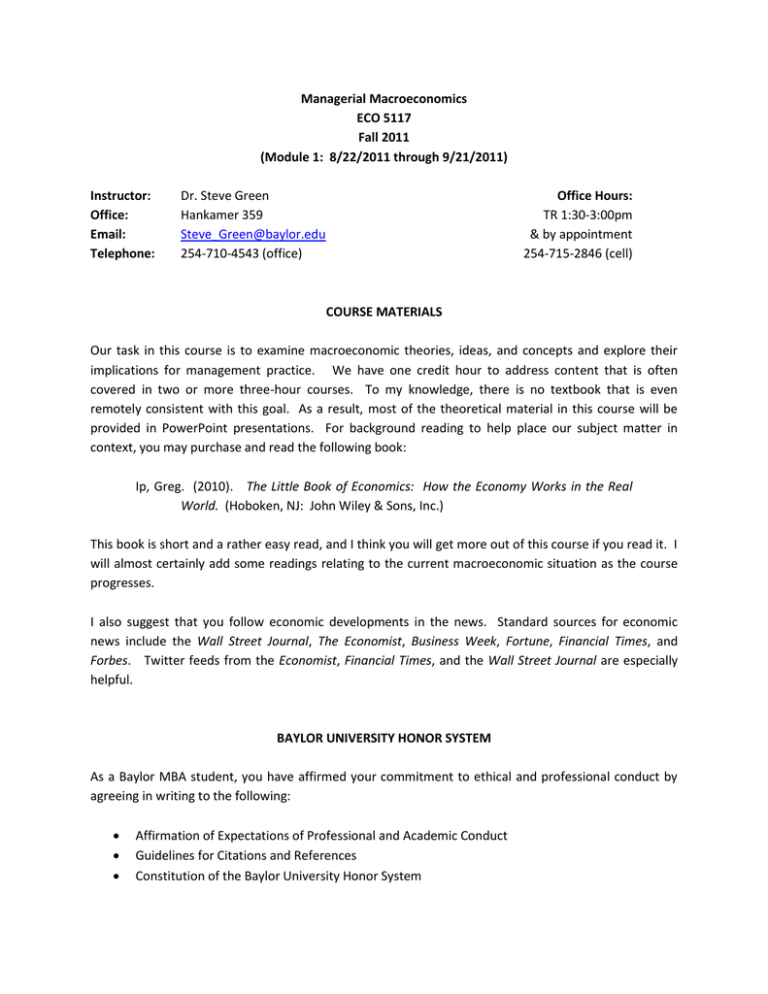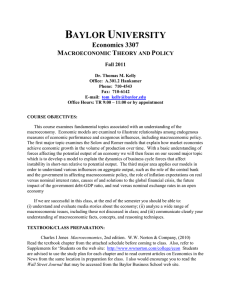Managerial Macroeconomics ECO 5117 Fall 2011 (Module 1: 8/22/2011 through 9/21/2011)
advertisement

Managerial Macroeconomics ECO 5117 Fall 2011 (Module 1: 8/22/2011 through 9/21/2011) Instructor: Office: Email: Telephone: Dr. Steve Green Hankamer 359 Steve_Green@baylor.edu 254-710-4543 (office) Office Hours: TR 1:30-3:00pm & by appointment 254-715-2846 (cell) COURSE MATERIALS Our task in this course is to examine macroeconomic theories, ideas, and concepts and explore their implications for management practice. We have one credit hour to address content that is often covered in two or more three-hour courses. To my knowledge, there is no textbook that is even remotely consistent with this goal. As a result, most of the theoretical material in this course will be provided in PowerPoint presentations. For background reading to help place our subject matter in context, you may purchase and read the following book: Ip, Greg. (2010). The Little Book of Economics: How the Economy Works in the Real World. (Hoboken, NJ: John Wiley & Sons, Inc.) This book is short and a rather easy read, and I think you will get more out of this course if you read it. I will almost certainly add some readings relating to the current macroeconomic situation as the course progresses. I also suggest that you follow economic developments in the news. Standard sources for economic news include the Wall Street Journal, The Economist, Business Week, Fortune, Financial Times, and Forbes. Twitter feeds from the Economist, Financial Times, and the Wall Street Journal are especially helpful. BAYLOR UNIVERSITY HONOR SYSTEM As a Baylor MBA student, you have affirmed your commitment to ethical and professional conduct by agreeing in writing to the following: Affirmation of Expectations of Professional and Academic Conduct Guidelines for Citations and References Constitution of the Baylor University Honor System Page 2 You may access the Baylor University Honor Code at: http://www.baylor.edu/honorcode/index.php?id=44060 If I suspect anyone in the class of violating the Honor Code, I will follow the procedures outlined in the University policy. Note that the policy requires me to report any violation, and that information will go into a student’s permanent record. CLASS ATTENDANCE Hankamer School of Business policy requires that to earn credit in a course the student must attend at least 75% of all class meetings. (http://www.baylor.edu/student_policies/index.php?id=22214) Carrying one credit hour, this course has a total of nine (9) class meetings. 75% of 9 is 6.75. Thus you must attend at least seven (7) of the nine meetings or you will, as directed by university policy, automatically receive a course grade of “F.” The university policy also states that “[the] student bears the responsibility for the effect which absences may have upon class participation, announced and unannounced examinations, written assignments, reports, papers, and other means of evaluating performance in a course.” One of the nine class meetings will be devoted to an exam. Thus course content will be delivered in 8 meetings. If you miss the maximum allowable number of meetings (2), you will therefore miss one fourth (25%) of content coverage. My hope and expectation is that you will make every effort to attend all meetings rather than making the minimum effort necessary to “get by.” The latter attitude does not bode well for your future success and may, as noted below, have implications for your course grade. I also expect all students to arrive on time for the beginning of class. A late arrival to a class may be counted as an absence from the class and thereby be subject to the University absenteeism policy. PLAGIARISM Students agree that by taking this course, all required papers, exams, class projects, or other assignments submitted for credit may (upon direction of the course instructor) be submitted to turnitin.com or similar third parties to review and evaluate for originality and intellectual integrity. A description of the services, terms, and conditions of use, and privacy policy of turnitin.com is available on its web site: http://www.turnitin.com. Students understand that all work submitted to turnitin.com will be added to its database of papers. Students further understand that if the results of such a review support an allegation of academic dishonesty, the course work in question as well as any supporting materials may be submitted to the Honor Council for investigation and further action. Page 3 MBA LEARNING GOALS The learning goals for the MBA program are: MBA1. To understand and apply theoretical knowledge in integrated fundamental areas of accounting, economics, finance, information systems, marketing, operations management, organization behavior, quantitative business analysis, and strategic management; MBA2. To think critically, to solve problems effectively, and make decisions strategically across functional areas; MBA3. To work collaboratively with others in cross-functional teams, and to motivate, lead, and mentor others; MBA4. To articulate ideas and information effectively and persuasively in every business context. MBA5. To apply core ethical values of integrity, accountability, and service in all circumstances. COURSE DESCRIPTION AND OBJECTIVES This course uses economic analysis to help you understand the national and international economic environment in which firms operate. Upon successful completion of this course, you will: 1. Understand the determinants of long-run trends in production, prices, employment, and international trade [MBA1]; 2. Be able to determine the short-run and long-run macroeconomic effects of various types of “shocks” (actual or prospective events in the “real world”) [MBA2]; 3. Understand and describe how macroeconomic trends have influenced a particular firm and/or industry in the last few decades [MBA1; MBA4]; and 4. Determine and explain the effects of specific kinds of macroeconomic “shocks” on a particular firm or industry [MBA1; MBA4] 5. Understand how macroeconomic data may be presented in misleading ways to further a specific agenda [MBA5] COURSE REQUIREMENTS Our typical class meeting will proceed as follows: Begin with a 20-30 minute discussion of an assignment that was given at the end of the previous class meeting. Presentation by instructor of the day’s new material At the end of the class meeting, you will be given an assignment that will be due at the beginning of the next session. Specific requirements regarding the assignments are described below. In addition, you will also complete a more detailed project that will be due near the end of the course schedule. Page 4 Preparing for Class. In this class, the readings from the (optional) book provide background for the material to be discussed in class. Very little (if any) in the book will be the direct subject of assignment or exam questions. You will benefit most from the class meetings if you have read the assigned chapters prior to the class meeting. Daily Assignments. This course has a total of nine (9) meetings. There will be no daily assignment due either at the first class meeting or at the last (9th) class meeting. Assignments will be due at meetings 2, 3, 4, 5, 6, 7, and 8. Thus you will have a total of seven (7) assignments. These assignments will each have a total number of possible points. At the end of the semester, I will drop your lowest (in terms of percentage of possible points) assignment grade. I will then compute your “Assignment Average” as the percent of total possible points you have earned on the six assignments. Your daily assignment average will count as 30% of your course grade. Course grade determination is discussed in detail below. Project. For this assignment, I will ask you to choose a firm or industry for which you may obtain at least thirty (30) years of data on variables of interest. Your task will be to prepare a memorandum in which you describe how the variables of interest relate to related macroeconomic variables. I will provide more detail on the project requirements early in the semester. This project will count 30% of your course grade. Exam. A comprehensive in-class exam over all material covered in this course will be administered on the 9th class day (Wednesday, 9/21). The exam will consist of ten (10) questions – i.e., questions that can normally be answered in one or two paragraphs. Each question will have a point value of 10, so the maximum possible score on the exam will be 100. The daily assignments will sometimes include questions like those you are likely to see on the exam. Your exam grade will count for 30% of your overall grade. Class Participation will count for 10% of your course grade. At the end of the course I will rate your participation as either “good” (100 points out of a possible 100), adequate (80 points), poor (40 points) or unacceptable (0 points). My rating will be based on the quality of your contribution to the overall learning experience. Talking too much will have a negative effect on your grade, as will talking too little. Page 5 GRADING SCALE At the end of the semester I will compute your final average as follows: Final Average = 0.3*Daily Assignment Average + 0.3*Project Grade + 0.3*Exam Score + 0.1*Class Participation Grade Your course grade will be determined according to your final average (FA) as follows: Grade -------A AB+ B BC+ C CD F Final Average (FA) Range ---------------------------FA > 93.0 90.0 < FA < 93.0 88.0 < FA < 90.0 83.0 < FA < 88.0 80.0 < FA < 83.0 78.0 < FA < 70.0 73.0 < FA < 78.0 70.0 < FA < 73.0 60.0 < FA < 70.0 FA < 60.0 The above grade cut-offs may be viewed as “worst case scenarios” for you, the student. If your final average is 93.0 or above, you will receive a course grade of “A” regardless of any other factor (assuming you are in compliance with the University policy on class attendance – if not, you will receive a grade of “F” in the absence of extremely compelling circumstances). If your average is slightly below a cutoff (92.8, for example), I may choose to give you the next higher letter grade if in my judgment your overall performance in the course justifies doing so. Factors I will take into account in making this determination include (i) whether your assignment work was consistently of high quality – that is, consistently above the minimum required to receive a passing grade, and (ii) the quality of your participation in class discussions. The decision as to whether I award you a higher course grade than the one directly implied by your final average is entirely at my discretion. DISCLAIMER I hereby reserve the right to make changes in any part of this syllabus if in my judgment those changes are warranted. In the event that I decide a change is necessary, I will post the revised syllabus on the course Blackboard site along with an announcement explaining the rationale for the change. Page 6 DAILY COURSE SCHEDULE Meeting #1: Monday, August 22 Macroeconomic Data and Information o Ip, Chapter 1 (pp. 14-16) o Ip, Chapters 4-5 Meeting #2: Wednesday, August 24 Domestic Macro Analysis: Long-Term Trends o Ip, Chapter 1, pp. 1-14 o Ip, Chapter 13 Meeting #3: Monday, August 29 Domestic Macro Analysis: Short-Term Fluctuations o Ip, Chapters 2, 8, 9, 12, 14, 15 Meeting #4: Wednesday, August 31 International Macroeconomic Data and Information LABOR DAY HOLIDAY: Monday, September 5 Meeting #5: Wednesday, September 7 Basics of International Trade and Finance o Ip, Chapters 6, 7, 11 Meeting #6: Monday, September 12 International Macro Analysis Meeting #7: Wednesday, September 14 Review of Theory Following the Economy o Ip, Chapters 3, 10 Selected Macro Topics of Special Interest to Managers o Durability and Cyclicality o Service Sector Cost Disease Meeting #8: Monday, September 19 Management Issues Raised by Domestic Macro Phenomena Management Issues Raised by International Macro Phenomena Meeting #9: Wednesday, September 21 EXAM



